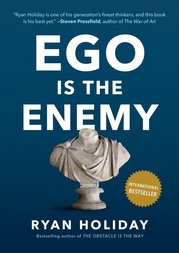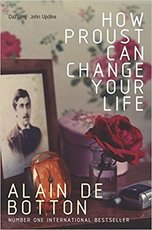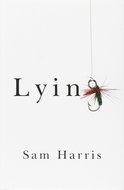 I finally just finished reading Ego is the Enemy by Ryan Holiday. He's one of my favorite writers, but I got way behind on his books (he now has 2 more new ones that I can't wait to read!). I really enjoyed this book, and it was a refreshing reminder of all the ways our ego can cause us to screw up, even (or maybe especially) while we're "succeeding." It was a short, pleasant read, and each chapter had a main, easily digestible lesson that was illustrated with stories of historical figures. I'm a big fan of the way Ryan can distill so much information (books, quotes, history, movies, etc.) into concrete, actionable lessons. I had interviewed Ryan for Authors@Google a while ago for his previous book The Obstacle is the Way, which I also really enjoyed. My biggest takeaways were around humility, "alive time vs. dead time," and maintaining focus on one's work (instead of others' opinions or external factors). My full notes on the book are below.
0 Comments
 I heard about How Proust Can Change Your Life by Alain de Botton from Tim Ferriss's podcast episode with the author. I love French literature, though I (ironically) haven't had time yet to read the seven-volume opus In Search of Lost Time by Marcel Proust that forms the foundation for Alain de Botton's recommendations. In a neat and short book, Alain de Botton goes through 9 different parts of life (such as love, reading, suffering, time management, emotions, and friendship) to distill the lessons relevant to each from the various writings (and personal experiences) of Proust. I found the section about how to put books down and the limits of reading to be most interesting and impactful. I also liked the lessons around appreciating art and objects around you, suffering well, and expressing yourself in an original way. I had learned about Proust of course before but not in as much depth, and I actually think that Alain de Botton's book will give me a good path to better enjoying and appreciating Proust's actual book when I get around to reading it. Some of my main notes and takeaways on the book are below.  I've had a really crazy month and a half, but things are settling down a bit now, so I want to catch up on blog posts for the books I completed earlier this year. I enjoyed Sam Harris's Waking Up book and have recently been getting into his podcast by the same name. I heard about his Lying book, and I found it to be an interesting, quick read which hit on a lot of good points that I hadn't thought much about. Since reading it, I have noticed myself paying more attention to the concept of honesty in all its forms. Below are my notes on the book. Lying is intentionally hoping to deceive others who expect honest communication Ppl lie so others form beliefs that are not true Truthfulness is being accurate to one's beliefs Doesn't require speaking whole truth All lies harm relationship Two types of lies: omission vs commission White lies Not ok Deny friends access to reality “Thank you but it's not my style” False encouragement bad. Steals time from another person. Medical deception Misses opportunities for bonding Trust Tiny erosions to trust from white lies on canceling events Sets bad example in front of kids Do not lie Fake praise Wastes time Criticism is what we most need to hear Allows others to trust u when u say something good Secrets Don't have to disclose everything Keeping secret is a burden Worth avoiding Mental accounting Integrity Avoiding behavior leading to remorse Don't pretend to be someone ur not Big lies Illusory truth effect: Familiarity breeds credence. Conclusion Recoiling from relationship Children Still only tell truth Kids love fiction even when know it Surprise parties bad Can still say there's a party or trip but keep destination a mystery |
Archives
June 2024
Categories
All
Subscribe |
 RSS Feed
RSS Feed
